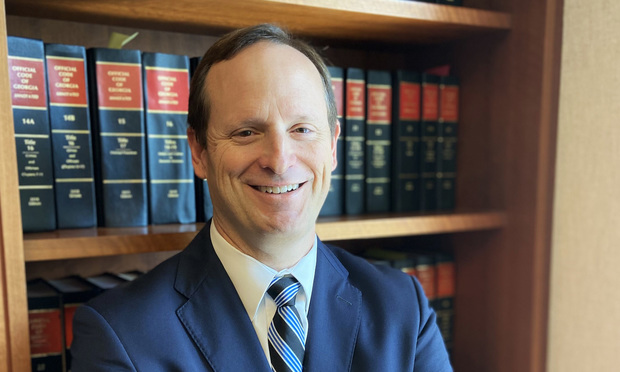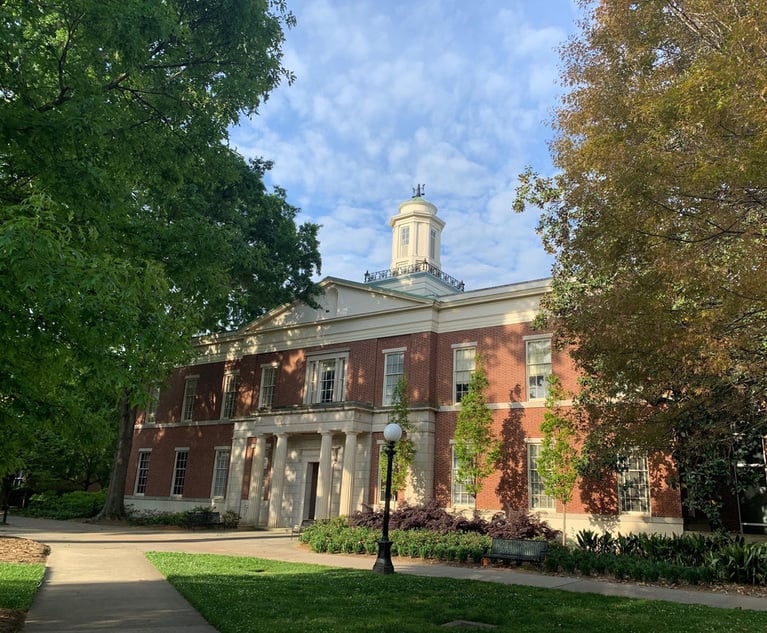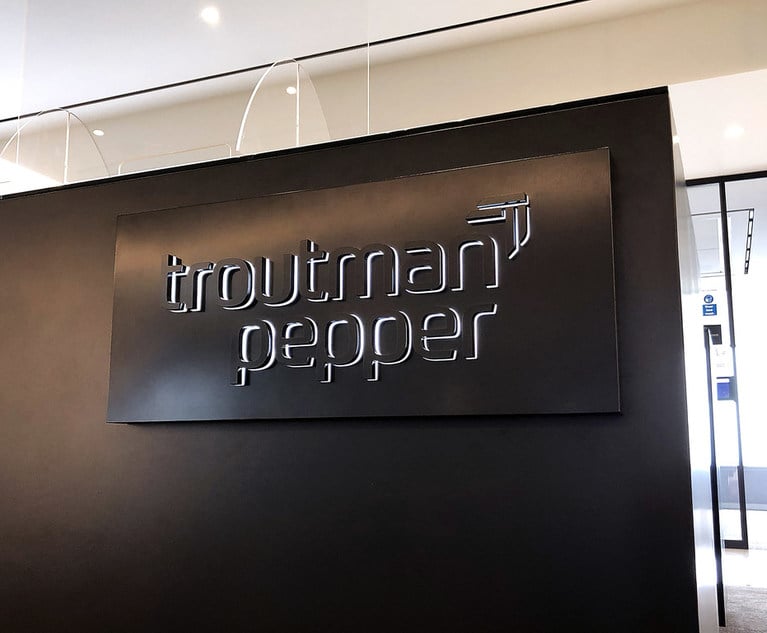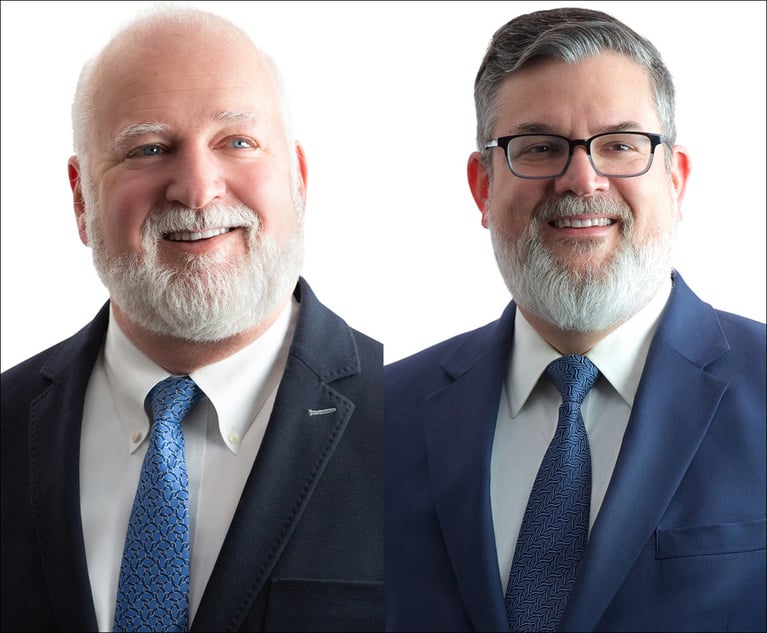Georgia State Court Judges' Leader Expects Uptick in Civil Litigation Pace
Judge Wes Tailor declined to predict when civil trials will restart but forecast that statewide filing deadlines reinstated July 14 will get cases moving faster.
July 22, 2020 at 06:07 PM
7 minute read
 Judge Wesley Tailor, Fulton County State Court. (Courtesy photo)
Judge Wesley Tailor, Fulton County State Court. (Courtesy photo)
As the statewide court shutdown enters its fifth month, the Georgia Council of State Court Judges' president gave the Daily Report a status update on what to expect for civil litigation.
Filing deadlines reinstated statewide last week will likely quicken the pace of civil cases slowed by the suspension of trials, triggering judicial status conferences and an uptick in motion practice, said Judge Wes Tailor of Fulton County State Court, who became the council's president in May.
Plaintiffs and defense litigators alike have been frustrated over work slowdowns from the pandemic-prompted court shutdown. At Hall Booth Smith, which has a large defense litigation practice, co-founder John Hall told the Daily Report in early July that second-quarter productivity was down about 15% to 20%, and not being able to do "in-person depositions, interviews, hearings, meetings, settlement conferences or mediation has cost us significant revenue."
Civil litigants file far more cases in Georgia state courts than in superior ones. There were 74,082 new civil filings in state courts last year, compared with 55,112 for superior courts.
Disputes in state courts "are all about money," Tailor said, because these courts handle all civil disputes that don't require equity action from a judge, such as an injunction. That includes wrongful death, serious personal injury, medical and legal malpractice, product liability and breach of contract cases.
Somewhat surprisingly, Tailor said the number of new cases filed since March in Fulton State Court—the state's busiest—hasn't changed significantly, which he attributed to Fulton's electronic filing capabilities.
But what has changed, the judge said, is the case resolution rate, which has fallen in Fulton relative to a year ago—even with Zoom judicial hearings and mediations.
An impending trial date does help keep cases moving toward resolution, he acknowledged. "When folks have a deadline, it tends to focus their attention. Without a trial date pending, some cases might not resolve that otherwise might."
The pandemic has affected Georgia's 71 state courts differently, Tailor added. For one, e-filing technology varies widely by court, especially for those in rural counties with fewer resources. Some judges outside of metro Atlanta have reported a sharp drop-off in new filings, he said, and one South Georgia judge told him that "civil litigation has slowed to a crawl."
Filing Deadlines
Tailor declined to speculate on when civil jury trials will return to court calendars, but he does expect the reinstatement of filing deadlines to help hasten case resolution.
Georgia courts remain closed until at least Aug. 11, but, in a positive sign for firms concerned about billable hours, Georgia Supreme Court Chief Justice Harold Melton has reinstated deadlines for civil and criminal cases. The chief justice's order restarted the deadline clock for litigation tolled March 14 to resume ticking on July 14, except for jury trial proceedings.
That will likely get cases moving faster, Tailor said. "What litigants are probably going to see is more judges having status conferences in cases."
He, for one, will resume holding status hearings via Zoom in August. "That tends to get things moving," the judge said, especially for cases he hasn't heard from in a while. While status conferences are at the discretion of Georgia's 147 state court judges and senior judges, Tailor said other judges have told him they plan to do the same.
Like trials, status hearings focus parties' attention on the case, Tailor said, because they must update a judge on where things stand. That could be productive for litigators, he added. "When they must report to a client on either side—whether defense or plaintiffs—attorneys want to be able to tell them something is happening."
Tailor cautioned that some litigators don't seem aware that blanket tolling for civil cases ended last week. "One thing I'd like to impart to civil attorneys is that they need to really pay attention to the due dates on whatever filings they have coming up," the judge said. "Some have not been as attentive as they could. They need to read that emergency order."
Tailor offered litigators an additional message from his communications with his fellow state court judges during the pandemic. "We have been very pleased with the level of professionalism and courtesy lawyers have extended to each other," he said. "I hope that continues as we go forward in whatever the capacity."
Virtual Court
Tailor has a full schedule of hearings, motions and orders—all conducted via Zoom—since he's handling all aspects of his civil case docket except trials. But, like many trial lawyers, the judge said he is not as busy as he was before the court closures.
Ordinarily, he runs a five-week calendar, with a week each for nonjury civil and criminal hearings, followed by three trial weeks for civil and criminal cases. "I don't have those three trial weeks now," Tailor said, adding that he and his staff are instead scheduling non-jury matters every week.
Other metro Atlanta judges are also holding Zoom or WebX hearings for motions to dismiss or for summary judgment and the like, and some are holding bench trials.
But despite all the Zoom depositions and judicial hearings, many plaintiffs and defense lawyers have less work overall, because they're not preparing for trials. Even for defense litigators who don't handle a lot of trials, Tailor noted, it takes a lot of time, pretrial, either to attempt to resolve a case or work it up for a trial.
And as with e-filing capabilities, many state court judges outside of metro Atlanta aren't able to hold virtual court as easily, the judge said. Those in rural counties may not have the budget for video hearings, because Zoom is only free for a limited amount of time and participants.
"What people forget sometimes is that some counties don't have the same access to resources as we do here in Fulton or metro Atlanta," Tailor said.
Tailor forecast that the renewed filing deadlines will significantly increase motion practice. Response motions with their deadlines stayed now will need to be addressed, and that will increase when trial-related filing deadlines are restored.
Several types of civil litigation expected to surge, such as foreclosures, evictions and bankruptcies, are not under state courts' jurisdiction.
Trial Safety Logistics
It could be a while before the growing backlog of civil trials goes before a jury, since criminal trials take precedence.
"The biggest challenge we judges face is to balance the obligation to manage our dockets efficiently, while not exposing our staff, litigants and the public to unreasonable harm," Tailor said.
Safely restarting jury trials directly depends on how a courthouse is configured, the judge warned, not just social-distancing precautions in individual courtrooms.
"Trying to move people through security and into the courtrooms is a serious logistical issue," he said, and, again, it varies by courthouse. The Fulton County Courthouse, for instance, houses magistrate, probate, state and superior courts in a structure with just three entrances and a single elevator bank.
The number of people available for jury pools also may be limited because of safety concerns. Fulton State Court hasn't had any problem getting sufficient jurors in Tailor's decade on the bench, he said, but priority for juries will go to felony cases in superior court where someone is in jail awaiting trial and other cases where people's liberty is at stake.
NOT FOR REPRINT
© 2025 ALM Global, LLC, All Rights Reserved. Request academic re-use from www.copyright.com. All other uses, submit a request to [email protected]. For more information visit Asset & Logo Licensing.
You Might Like
View All
28 Firms Supporting Retired Barnes & Thornburg Litigator in Georgia Supreme Court Malpractice Case
7 minute read
Troutman Pepper Says Ex-Associate Who Alleged Racial Discrimination Lost Job Because of Failure to Improve
6 minute read

Law Firms Expand Scope of Immigration Expertise Amid Blitz of Trump Orders
6 minute readLaw Firms Mentioned
Trending Stories
- 1New Strategies For Estate, Legacy Planning
- 2Leaning Into ‘Core’ Strengths, Jenner’s Revenue Climbs 17%, Profits Soar 23%
- 3Frito Lays Could Face Liability for Customer's Grocery Store Fall Over Pallet Guard, Judge Rules
- 4Holland & Knight Expands Corporate Practice in Texas With Former Greenberg Traurig Partner
- 5Heir Cut: Florida Appellate Court Backs Garth Reeves' Will
Who Got The Work
J. Brugh Lower of Gibbons has entered an appearance for industrial equipment supplier Devco Corporation in a pending trademark infringement lawsuit. The suit, accusing the defendant of selling knock-off Graco products, was filed Dec. 18 in New Jersey District Court by Rivkin Radler on behalf of Graco Inc. and Graco Minnesota. The case, assigned to U.S. District Judge Zahid N. Quraishi, is 3:24-cv-11294, Graco Inc. et al v. Devco Corporation.
Who Got The Work
Rebecca Maller-Stein and Kent A. Yalowitz of Arnold & Porter Kaye Scholer have entered their appearances for Hanaco Venture Capital and its executives, Lior Prosor and David Frankel, in a pending securities lawsuit. The action, filed on Dec. 24 in New York Southern District Court by Zell, Aron & Co. on behalf of Goldeneye Advisors, accuses the defendants of negligently and fraudulently managing the plaintiff's $1 million investment. The case, assigned to U.S. District Judge Vernon S. Broderick, is 1:24-cv-09918, Goldeneye Advisors, LLC v. Hanaco Venture Capital, Ltd. et al.
Who Got The Work
Attorneys from A&O Shearman has stepped in as defense counsel for Toronto-Dominion Bank and other defendants in a pending securities class action. The suit, filed Dec. 11 in New York Southern District Court by Bleichmar Fonti & Auld, accuses the defendants of concealing the bank's 'pervasive' deficiencies in regards to its compliance with the Bank Secrecy Act and the quality of its anti-money laundering controls. The case, assigned to U.S. District Judge Arun Subramanian, is 1:24-cv-09445, Gonzalez v. The Toronto-Dominion Bank et al.
Who Got The Work
Crown Castle International, a Pennsylvania company providing shared communications infrastructure, has turned to Luke D. Wolf of Gordon Rees Scully Mansukhani to fend off a pending breach-of-contract lawsuit. The court action, filed Nov. 25 in Michigan Eastern District Court by Hooper Hathaway PC on behalf of The Town Residences LLC, accuses Crown Castle of failing to transfer approximately $30,000 in utility payments from T-Mobile in breach of a roof-top lease and assignment agreement. The case, assigned to U.S. District Judge Susan K. Declercq, is 2:24-cv-13131, The Town Residences LLC v. T-Mobile US, Inc. et al.
Who Got The Work
Wilfred P. Coronato and Daniel M. Schwartz of McCarter & English have stepped in as defense counsel to Electrolux Home Products Inc. in a pending product liability lawsuit. The court action, filed Nov. 26 in New York Eastern District Court by Poulos Lopiccolo PC and Nagel Rice LLP on behalf of David Stern, alleges that the defendant's refrigerators’ drawers and shelving repeatedly break and fall apart within months after purchase. The case, assigned to U.S. District Judge Joan M. Azrack, is 2:24-cv-08204, Stern v. Electrolux Home Products, Inc.
Featured Firms
Law Offices of Gary Martin Hays & Associates, P.C.
(470) 294-1674
Law Offices of Mark E. Salomone
(857) 444-6468
Smith & Hassler
(713) 739-1250






